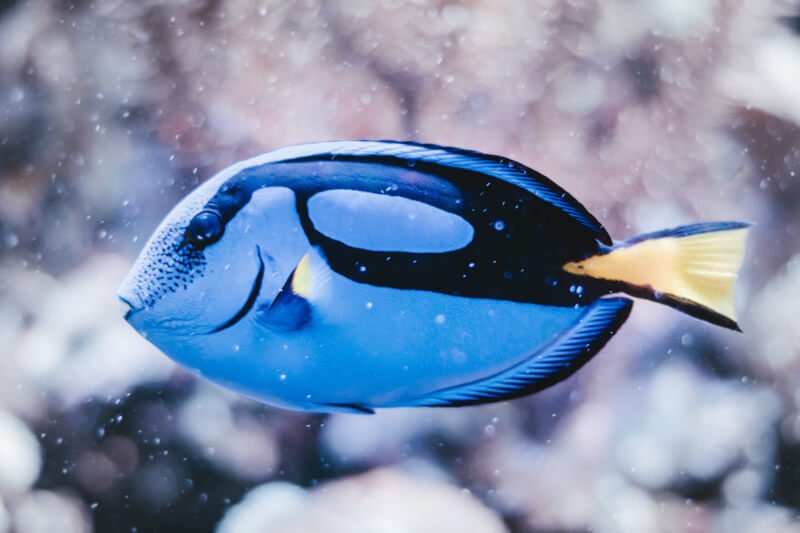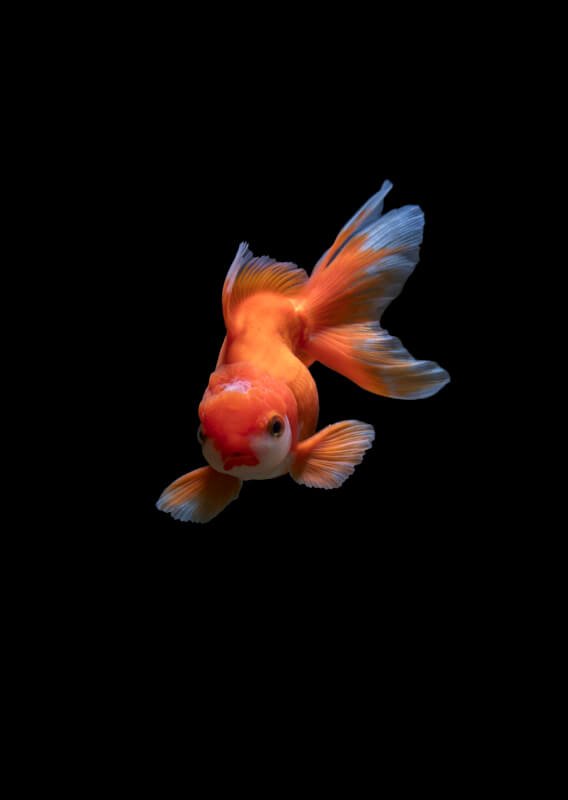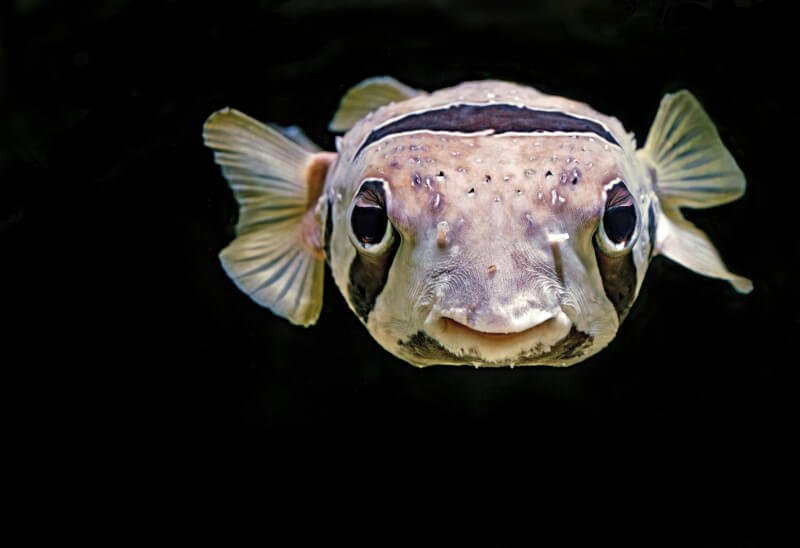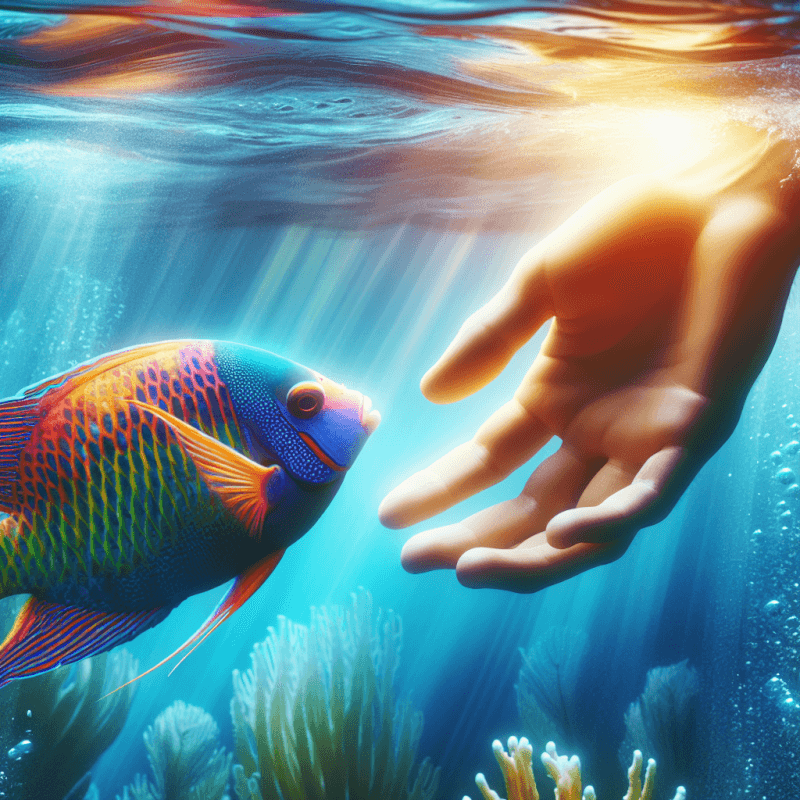Imagine having a pet fish that greets you every time you approach its aquarium. The question arises – do fish recognize their owners? It may surprise you to discover that these seemingly dim-witted creatures possess a surprising level of recognition and memory. In this article, we will explore the fascinating world of fish cognition and delve into the question of whether fish can truly establish a bond with their owners. So, grab your snorkel and dive into the depths of the underwater universe to unravel the secrets of fish-owner relationships.

Instinct vs. Recognition
When it comes to fish behavior, there is a fascinating interplay between instinct and recognition. Instinct refers to innate behaviors that are genetically programmed and do not require prior experience or learning. However, recognition involves the ability to identify and remember specific individuals or objects based on visual cues, sounds, or smells. In the case of fish, researchers have been exploring their capabilities for recognition and the impact it may have on their interactions with humans.
Ready for Cat Trivia?
Test your knowledge about cats!

Instinctual Behavior in Fish
Fish exhibit a wide range of instinctual behaviors that are vital for their survival. These behaviors include feeding, reproduction, predator avoidance, and migration. For example, many fish species instinctively know how to feed on their preferred prey, even without prior exposure to it. Similarly, fish instinctively engage in courtship rituals and nest building during the breeding season. These behaviors are essential for their survival and species propagation, but they do not necessarily involve recognition of specific individuals.
The Phenomenon of Recognition
Recognition, on the other hand, involves the ability to perceive and remember specific individuals or objects. It is a cognitive process that requires sensory perception and memory formation. Recognizing one’s owner is often associated with pets like dogs or cats, but can fish also exhibit such behaviors? While it may seem unlikely, there have been anecdotal accounts of fish recognizing and responding to their owners, which has spurred scientific interest in understanding the phenomenon.
Differentiating between Instinct and Recognition
Differentiating between instinct and recognition in fish can be challenging. Some behaviors that may initially appear instinctual could actually involve recognition. Take feeding responses, for example. Fish may have evolved to associate certain visual cues, such as the movements of their owner’s hand, with feeding. This association may be learned and memorized over time, rather than purely instinctual.
To better understand the distinction between instinct and recognition, researchers have turned to experimental studies to explore fish recognition abilities.
Research on Fish Recognition Abilities
Scientists have conducted various studies to investigate how fish perceive and recognize their surroundings, including their owners. These studies employ different methodologies and focus on various sensory modalities to assess fish recognition abilities.
Visual Recognition
Fish visual systems play a crucial role in their interactions with the environment. Their eyes are adapted to detect and process visual information, allowing them to navigate and identify objects in their surroundings. But how does this visual system contribute to the recognition of their owners?
Fish Visual Systems
Fish possess visual systems that are highly adapted to their underwater environment. Many species have excellent color vision, allowing them to distinguish between different hues and patterns. They also have a wide field of view, with eyes positioned on either side of their head, enabling them to detect movement and potential threats from multiple directions. These adaptations suggest that fish may indeed have the ability to visually recognize their owners.
The Role of Color and Patterns
Color and patterns can provide important visual cues for fish recognition. Owners often have specific physical attributes, such as hair color, clothing, or distinct patterns on their skin, that could serve as distinguishing features for the fish. Studies have shown that certain fish species, such as the cichlids, are capable of discriminating between different colors and patterns. These findings suggest that fish might be able to recognize and differentiate their owners based on visual cues.
Studies on Fish Visual Recognition
Several scientific studies have been conducted to explore visual recognition abilities in fish. For instance, a study published in the journal “Animal Cognition” found that archerfish, a species known for its ability to shoot down prey with jets of water, could recognize and distinguish between human faces. This study demonstrated that fish could discriminate between different human faces and showed a preference for familiar faces, suggesting a capacity for visual recognition.
Auditory Recognition
While visual recognition is often the focus of research on fish behavior, auditory recognition also plays a significant role in their interactions with the environment, including their ability to recognize their owners.
Fish Hearing Abilities
Fish have well-developed auditory systems that allow them to perceive and process sounds. They rely on their hearing to communicate with conspecifics (members of the same species), locate potential prey, and detect predators. The ability to recognize specific sounds, including those produced by their owners, could be an important aspect of their auditory recognition abilities.
Recognition through Sound
Owners often use specific sounds or verbal cues when interacting with their fish, such as calling their names or using consistent commands. Fish may learn to associate these sounds with positive experiences, such as feeding or interaction, and recognize their owner based on these auditory cues. While fish may not understand the meaning behind the words, they can learn to associate the sounds with specific outcomes.
Experiments on Auditory Recognition
To investigate the auditory recognition abilities of fish, researchers have conducted experiments using sound playback techniques. These experiments involve playing recorded sounds or voices to fish and observing their behavioral responses. Some studies have shown that fish, like goldfish, can learn to associate specific sounds with rewards and can distinguish their owner’s voice among other voices. These findings suggest that auditory recognition could be an essential factor in fish recognizing their owners.
Sense of Smell and Chemical Recognition
In addition to visual and auditory recognition, fish also possess a well-developed sense of smell, which they use for various purposes, including identifying potential food sources, locating mates, and detecting predators. The sense of smell, or olfaction, is another sensory modality that could contribute to fish recognizing their owners.
Fish Olfactory Systems
Fish have olfactory systems that are highly sensitive to chemical signals in their environment. They possess olfactory epithelium, which contains olfactory receptor cells capable of detecting and distinguishing different odorants. The olfactory information is then processed in the fish’s brain, allowing them to perceive and interpret smells.
Chemical Signals and Odor Recognition
Fish owners often have distinct scents due to their personal care products, perfumes, or specific pheromones they produce. It is possible that fish can associate these chemical signals with positive experiences, such as feeding or interaction, and recognize their owner based on these smells. Chemical recognition could be particularly relevant in murky or low-visibility environments where visual recognition may be limited.
Investigating Fish’s Sense of Smell
Scientists have conducted experiments to investigate the olfactory abilities of fish and their potential for odor recognition. For example, a study published in “Ethology” found that convict cichlids could recognize and distinguish between the odors of familiar and unfamiliar individuals. This study demonstrated that fish have the capacity to discern between different odors and suggests that olfaction could play a role in recognizing their owners.

Social Bonding and Associative Learning
The social behavior of fish and their capacity for associative learning are important factors to consider when exploring their ability to recognize their owners. The formation of social bonds and the ability to learn from associations could contribute to the recognition of familiar individuals.
Social Behavior in Fish
Many fish species exhibit social behavior, forming social groups or hierarchies. They engage in affiliative behaviors, such as shoaling or schooling, which involve swimming together in coordinated patterns. These social interactions indicate that fish have the ability to recognize and differentiate between conspecifics. It is possible that similar mechanisms could be at play when it comes to recognizing their human owners.
The Role of Associative Learning
Fish have been shown to be capable of associative learning, which involves forming associations between stimuli or actions and their outcomes. For example, training fish to associate a specific visual or auditory cue with food rewards has been successfully demonstrated. Associative learning could help fish learn to recognize their owners by associating their presence or specific cues with positive experiences, such as feeding or interaction.
Fish and Owner Bonding
The relationship between fish and their owners can also contribute to recognition. Regular interactions, consistent handling and feeding patterns, and positive experiences can enhance the bond between fish and humans. The fish may learn to associate their owner’s presence or specific cues with safety and rewards, leading to recognition.
Studies on Social Bonding in Fish
Several scientific studies have focused on social bonding and recognition in fish. One study published in “Behavioural Processes” found that angelfish could learn to recognize and respond differentially to their tank mates. The study observed that the fish displayed preferential behavior towards familiar individuals, suggesting the formation of social bonds. These findings support the idea that fish have the capacity for social bonding and recognition.
Conditioning and Training
Training techniques are commonly used in pet animals to promote certain behaviors and enhance the human-animal bond. While fish may not be able to perform complex tricks like dogs, there is evidence to suggest that they can be conditioned to recognize their owners.
Fish Training Techniques
Fish training techniques often involve using positive reinforcement to establish an association between a specific cue or action and a reward. For example, feeding the fish immediately after a specific visual or auditory cue is presented can help them learn to associate that cue with food. Over time, the fish may recognize and respond to their owner’s cues or presence.
Positive Reinforcement
Positive reinforcement is a widely used training technique that rewards desired behaviors with pleasant outcomes. Fish can be trained through positive reinforcement by providing food rewards or favored stimuli when they exhibit the desired behavior, such as approaching their owner or responding to specific cues. This reinforcement strengthens the association between the behavior and the reward, promoting the recognition of their owner.
Conditioning Fish to Recognize Their Owner
Several anecdotal accounts and personal experiences suggest that fish can be conditioned to recognize their owners. By consistently associating positive experiences, such as food rewards or interaction, with specific cues or the owner’s presence, the fish may learn to recognize and respond to their owner. These conditioning techniques can contribute to strengthening the bond between fish and their humans.

Case Studies and Experiences
Anecdotal evidence from fish owners has provided intriguing accounts of fish recognizing their owners. While these stories cannot provide definitive scientific proof, they offer personal insights into the potential for recognition in fish.
Anecdotal Evidence of Fish Recognizing Their Owners
Fish owners have reported numerous instances where their fish seemed to recognize and respond to them. Some owners noticed that their fish became more active or approached the aquarium glass when they walked into the room, while others observed preferential behavior towards their hand or specific cues.
Stories from Fish Owners
Fish owners have shared heartwarming stories of their fish recognizing them and forming unique bonds. Some owners have described how their fish would follow their finger or hand movements, swim eagerly towards them during feeding time, or exhibit excitement when seeing their face. These stories highlight the potential for fish to recognize and respond to their owners based on visual or other sensory cues.
Unique Personal Experiences
Every fish owner has their own unique experiences and observations regarding their fish’s ability to recognize them. Some owners have reported specific behaviors that they interpret as recognition, such as their fish swimming to a particular spot or displaying excitement when they enter the room. These personal experiences add to the growing body of evidence supporting the concept of fish recognition.
Limitations and Variables
While there is evidence to suggest that fish can recognize their owners, it is important to acknowledge the limitations and variables that can influence these behaviors.
Factors Affecting Fish Recognition
Fish recognition abilities can be influenced by various factors, such as species-specific differences, individual variability, and environmental influences. Different fish species may have varying cognitive abilities, including their capacity for recognition. Additionally, individual fish within a species can exhibit different levels of cognitive skills, potentially affecting their ability to recognize specific individuals. Finally, environmental factors, such as tank conditions, social dynamics, and enrichment opportunities, can also impact recognition behaviors.
Species-Specific Differences
Fish species vary in their cognitive abilities and sensory adaptations, which can influence their capacity for recognition. Some species may have specialized visual or auditory systems that enhance their ability to recognize specific individuals, while others may rely more on other sensory modalities like olfaction. Understanding the species-specific differences is crucial in evaluating fish recognition abilities.
Individual Variability
Just as humans and other animals exhibit individual differences in cognitive abilities, fish are also likely to display variability in their recognition skills. Some fish may be more adept at recognizing specific individuals, while others may show limited or no recognition. Individual variability can be influenced by genetic factors, learning experiences, and environmental conditions.
Environmental Influences
The environment in which fish are kept can greatly affect their behavior and recognition abilities. Factors such as tank size, social composition, and enrichment opportunities can impact their cognitive development and overall well-being. Fish living in enriched and socially complex environments may exhibit enhanced cognitive skills, including recognition of their owners. Conversely, fish living in suboptimal conditions may not have the opportunity or motivation to engage in recognition behaviors.

Ethical Considerations
The topic of recognition in fish raises ethical considerations related to their welfare and the implications of human-animal bonding.
Impact of Recognition on Fish Welfare
Recognition and the formation of bonds with their owners can impact fish welfare. The ability to recognize familiar individuals may provide a sense of security and reduce stress in fish, promoting their overall well-being. Conversely, disruptions or changes in recognition patterns, such as prolonged absence or separation from their owner, may adversely affect fish welfare. It is important for owners to consider the potential impact on their fish when establishing and maintaining these relationships.
Ethical Implications of Human-Animal Bonding
The recognition and bonding between fish and their owners raise ethical questions regarding the nature of human-animal relationships and the responsibilities it entails. Owners have a duty to provide appropriate care, nutrition, and living conditions for their fish. Additionally, they should consider the emotional and cognitive capabilities of fish when forming these bonds and be mindful of any potential harm that may arise from improper care or interactions.
Balancing Conservation and Ownership
Recognizing and bonding with individual fish can have positive implications for ownership and the human-animal relationship. However, it is essential to balance these considerations with conservation efforts and the preservation of wild fish populations. Responsible ownership practices, such as sourcing fish from sustainable suppliers and providing proper care, can contribute to the conservation of fish species while still allowing for recognition and bonding with individual fish.
Future Research and Implications
Advancements in research methods and further exploration of fish cognitive abilities have the potential to shed more light on the recognition abilities of fish and their implications for animal behavior and welfare.
Advancements in Study Methods
Future research can benefit from advancements in study methods, including the use of advanced imaging techniques and genetic analyses. Techniques such as fMRI and neuroimaging can help map the neural networks involved in recognition processes, providing insights into the underlying mechanisms. Genetic analyses can help identify genes associated with recognition abilities, offering a better understanding of the genetic basis of fish cognition.
Further Exploration of Fish Cognitive Abilities
While progress has been made in understanding fish recognition abilities, there is still much to learn about their overall cognitive capabilities. Further exploration of memory formation, learning processes, and decision-making in fish can provide valuable insights into their cognitive abilities, including their capacity for recognition. Comparative studies across different fish species can help unravel the evolutionary history and adaptive significance of recognition behaviors.
Implications for Animal Behavior and Welfare
Studying fish recognition and the underlying cognitive processes can have broader implications for understanding animal behavior and welfare. Fish, as cognitive and sentient beings, deserve consideration and appropriate care based on their cognitive capabilities. Promoting awareness and education on fish cognition and recognition can help inform better welfare practices for captive fish and foster a greater understanding and appreciation of their cognitive abilities.
In conclusion, the question of whether fish recognize their owners is a subject of ongoing scientific interest. While research into fish cognition and recognition is still relatively limited compared to other animals, there is evidence to suggest that fish possess the ability to visually, audibly, and chemically recognize their owners. Factors such as species-specific differences, individual variability, and environmental influences can influence these recognition behaviors. Recognizing and forming bonds with fish has ethical implications for their welfare, and responsible ownership practices should be encouraged. Continued research on fish recognition abilities and their cognitive capacities can contribute to our understanding of animal behavior, welfare, and the unique human-animal bond.



